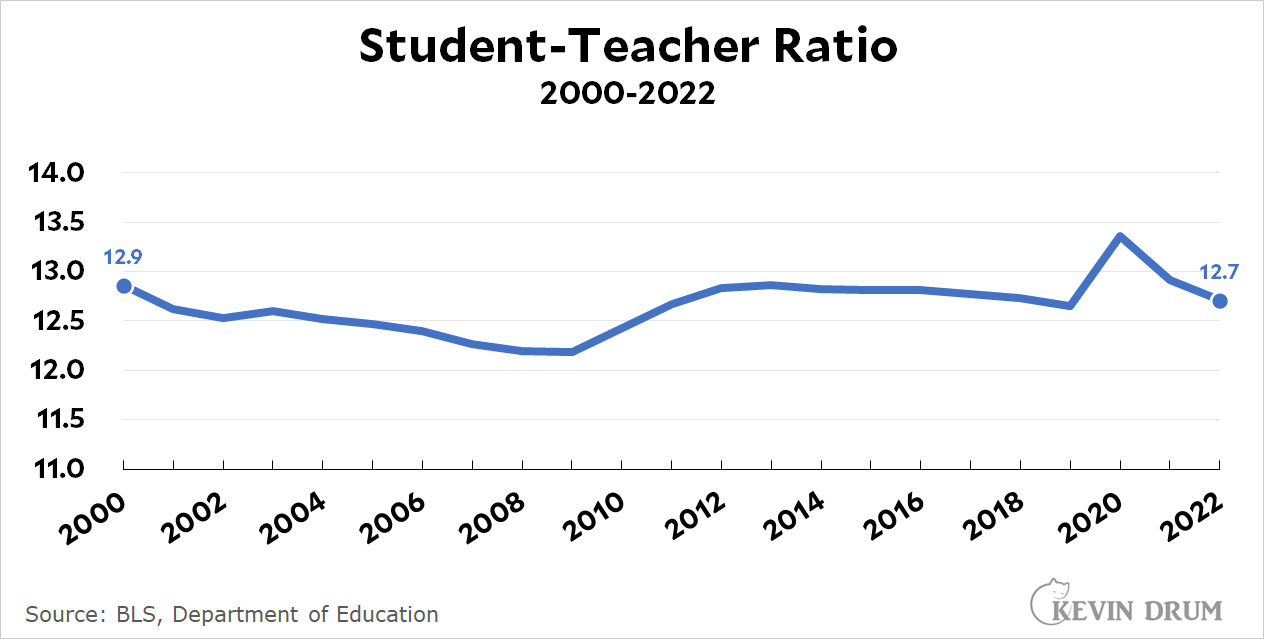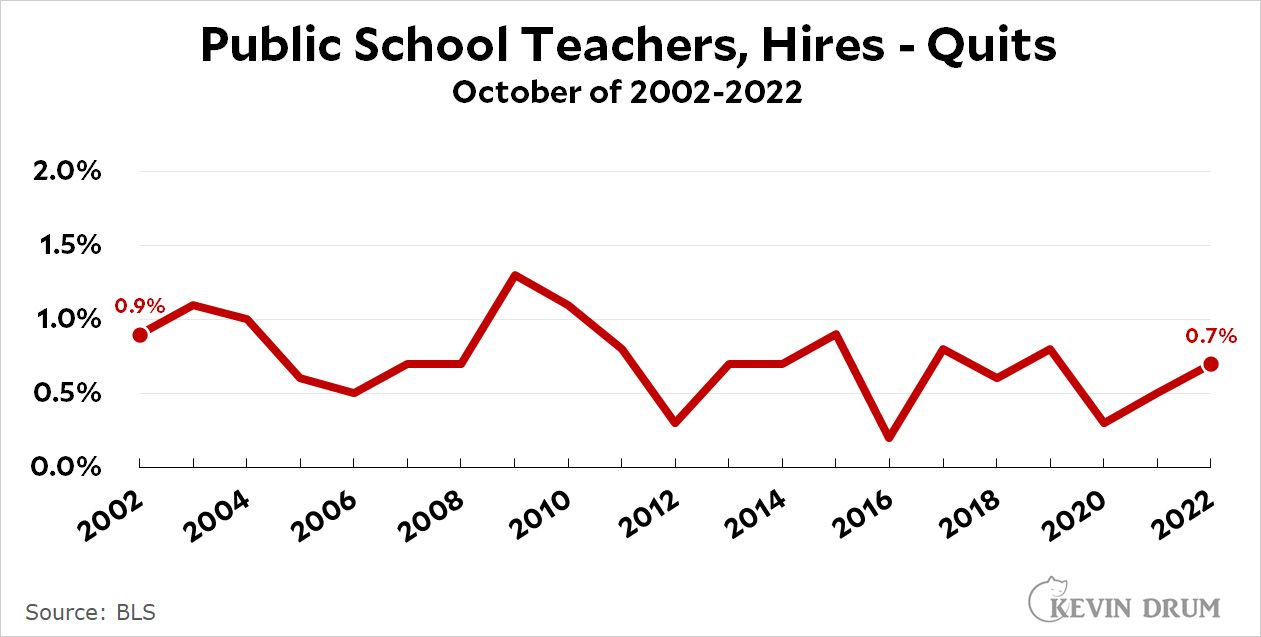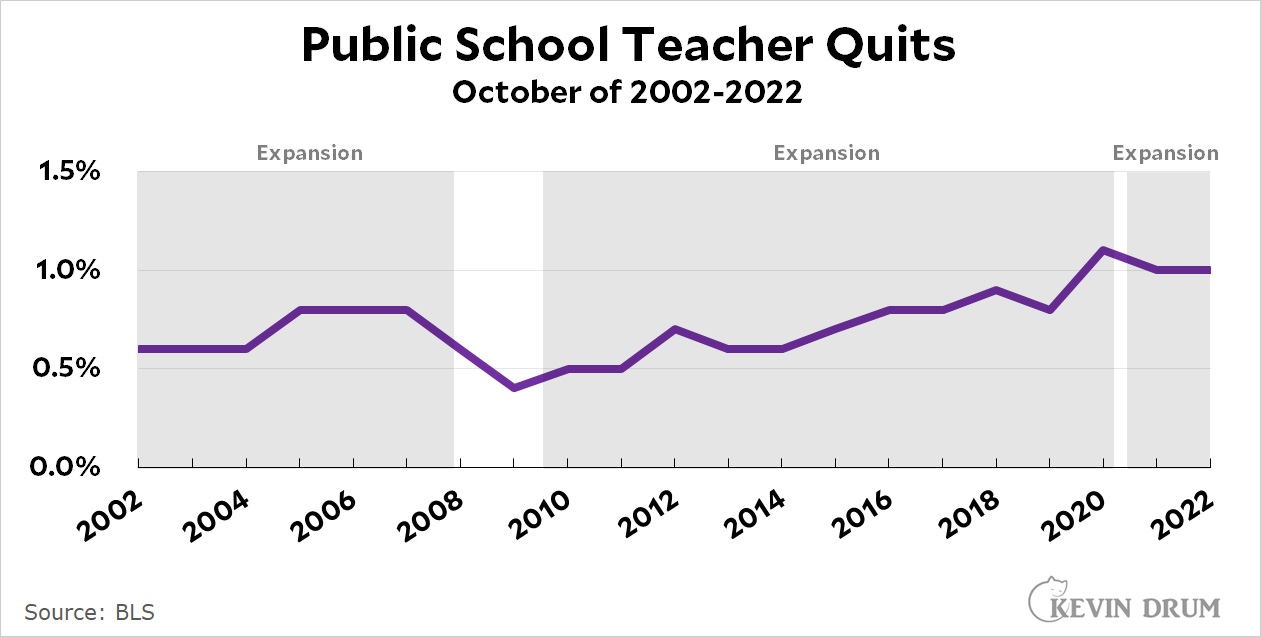Today brings yet another story about the catastrophic state of our public schools, this time from Tom Edsall. And I just don't know. These stories keep coming and coming even though the simplest, most straightforward data says there's nothing to it. Here is the K-12 student-teacher ratio for the past two decades:
 And here is the hiring rate vs. the quit rate for K-12 teachers:
And here is the hiring rate vs. the quit rate for K-12 teachers:
 Nothing much has changed. New hires outnumber quits in public school districts by about 0.7%, and this number has been pretty steady for the past decade.
Nothing much has changed. New hires outnumber quits in public school districts by about 0.7%, and this number has been pretty steady for the past decade.
And what about the raw number of quits? As boomers continue to age I'd expect a higher quit rate just due to retirements. But we haven't even seen that. For the past two decades quits have followed their usual pattern: down during recessions, when people are worried about finding another job, and up during expansions, when better jobs seem more plentiful:
 Maybe there are specific places that are having bigger troubles than before. Maybe there are specific areas, like bilingual or special ed, that are hurting. Maybe the quality of new hires is going down. All of these things are possible, and beyond that there's no question that the pandemic has had a short-term effect on classroom behavior and overall performance level.
Maybe there are specific places that are having bigger troubles than before. Maybe there are specific areas, like bilingual or special ed, that are hurting. Maybe the quality of new hires is going down. All of these things are possible, and beyond that there's no question that the pandemic has had a short-term effect on classroom behavior and overall performance level.
All that said, if you look at basic national statistics there's nothing very worrisome to see. The pandemic aside, test scores have been up or stable,¹ and the number of teachers has been stable. Unless I'm missing something big, there's really no cause for panic here.
¹Although scores among Black 12th graders fell in the most recent NAEP report.
SOURCES: K-12 enrollment, 2000-2021, here. K-12 enrollment estimate for 2022, here. Public school education employees (November), 2000-2022, here. About half of these are classroom teachers.
Hires and quits data from JOLTS series, here.

Unless teachers are fungible across state and district boundaries, you cannot just look at nationwide trends. And a lot suggests that teachers aren’t fungible across either set of lines: states have different requirements to be a teacher and districts lock teachers in with union contracts (you lose seniority starting over again in another district). So if teachers aren’t easily moved from one part of the country to another, then the distribution of them matters as much as the total number, and a lot of anecdotal data suggests some districts/states have had a better time retaining teachers than others have during the pandemic years.
I’m currently generating over $35,100 a month thanks to one small internet job, therefore I really like your work! I am aware that with a beginning cdx05 capital of $28,800, you are cdx02 presently making a sizeable quantity of money online.
Just Check ———>>> https://propaymentweb01.blogspot.com/
The proper responses to a crisis localized in some areas are not the same as a crisis on a national level. So, our comment may be true, but it isn't particularly relevant to Kevin's specific observations.
Agreed, but Kevin's whole obsession with this topic is "nothing needs to be done at a national level" which may not be true. After all, "the proper responses to a [hurricane, earthquake, wildfire, imminent collapse of the auto industry, first few months of the pandemic, just to name a few] crisis localized in some areas" was for the federal government to step in and help those localized areas... not to simply sit back and say "well, nationwide everything's OK so deal with it yourselves, area(s) in distress."
A month-back my cousin's step-mum basically earnt $2,900 just sitting there twelve hours a week in their apartment and they're best friend's mother-in-law`s neighbour has been doing this for nine months and easily made more than $12,000 part-time from their laptop.
Apply the instructions on this site.. https://payathome.blogspot.com/
What, no trendlines? Particularly for the second graph…
… and third.
I agree with the general thrust of the article... only a damn fool would become a teacher today.
"The combination of these factors — declining prestige, lower pay than other professions that require a college education, increased workloads, and political and ideological pressures — is creating both intended and unintended consequences for teacher accountability reforms mandating tougher licensing rules, evaluations and skill testing."
Anecdotally from a relative who is a middle school assistant principal in a Midwest suburban district... the kids are nuts!
Kevin, this is beneath you. Unemployment has been near record lows, and abuse of teachers has been widespread. In the face of that, an argument that there's no teacher shortage requires extraordinary evidence.
In place of that you tell us, "Hey, they've got just as many warm bodies as ever." If companies were hiring anyone who'd served in the military as qualified software engineers, would you say, "There's no tech worker shortage, they've got just as hires as ever"? And wait with your eyes firmly shut for the cascade of software failures?
Apparently, teachers are just totally fungible in Kevin's mind. If the nation lost 250,000 teachers during the pandemic, but found 250,000 people willing to quit their jobs at McDonald's or wherever to take the empty teaching positions, Kevin would conclude "this is fine. (Which is of course where several states are heading, indicating that there is a teacher shortage. Why else would states like Arizona, Oklahoma, Florida and the like be opening the schoolhouse doors to people with just high school diplomas and/or military service? For most jobs, you don't lower your standards unless you're having trouble finding applicants.)
Local and state-wide shortages exist. Teachers cannot just up and move from one state to another, because, in addition to family, housing, etc., there are different licensing/certification requirements that may necessitate additional educational credits.
Then there are areas of ability/ licensing. High school science or math teachers cannot be replaced by elementary school teachers, for example. Across many disciplines. There are also shortages of teacher support staff such as paraprofessionals who are dreadfully underpaid, even here in MA. And there are mismatches between salaries and housing costs.
Not any more in states like OK, AZ or FL. They're actively getting rid of whatever (crappy, judging from the quality of their schools) teaching requirements they had. OK and AZ now just require high school diplomas to teach. Florida allows ex-military to teach, no questions asked.
Of course, no quality teacher from a district in the states where teaching is still considered a master's level career is going to want to leave their existing job to go to work in one of the states that treats teachers as interchangeable with a Walmart or Burger King employee. But to people like Kevin and the leaders of those red states racing to the bottom in education, as long as a warm body is in the room, their qualifications increasingly don't matter.
The Nguyen paper that Edsall links, which seems to be the only quantitative information he gives, says "We find there are at least 36,000 vacant positions along with at least 163,000 positions being held by underqualified teachers". First, the number of vacant positions seems small in comparison to 3.6 million total teachers. There must always be unfilled positions in any field. Second, there is no information on what the number was in previous years, so no evidence that the number has grown. The authors apparently used lumped data from several recent years.
There have been many stories about declining conditions and morale, but as Kevin says, apparently no quantitative data supporting an actual national shortage.
Lack of evidence of an actual shortage doesn't mean that there is no reason to be disturbed about what is clearly an attack on public education by Republicans.
Not at all. OK and AZ allowing people with just high school diplomas to teach, and FL opening the door to veterans with no experience teaching to teach are just being done for no reason whatsoever. Certainly not because any of those states experienced difficulties filling teaching positions under their prior standards!
Isn’t Florida letting any military service count as a teaching credential because it’s too hard to find licensed teachers? And aren’t most rural counties hiring basically anyone who can read and write?
If we were filling nursing positions with Walmart greeters, I don’t think Kevin would say there’s no nursing shortage just because the overall number of positions were being filled at normal rates. This is conservative-level analysis, not nearly up to his normal standards.
The Jolts data for State and Local Education shows that Total Seperations exceeded Total hires by 770k in 2020.
in 2021 and 2022, Hires has exceeded by 590k.
So at the end of October we are short roughly 180k in public education. Maybe more if the number of employees should be growing each year.
This shortage appears to be supported by the massive number of job openings in this sector over the last 2 years. Job openings are significantly higher than they were prior to the 770k shortfall in 2020.
Kevin's charts seem designed to hide the ball.
I don't know if 190k shortfall is a significant number. Given that the teachers on the ground seem to think it is, I'd trust them more than random line graphs that exclude things like job openings or layoffs.
I would imagine you would never find a worker shortage in any industry if you ignored the job openings and layoffs.